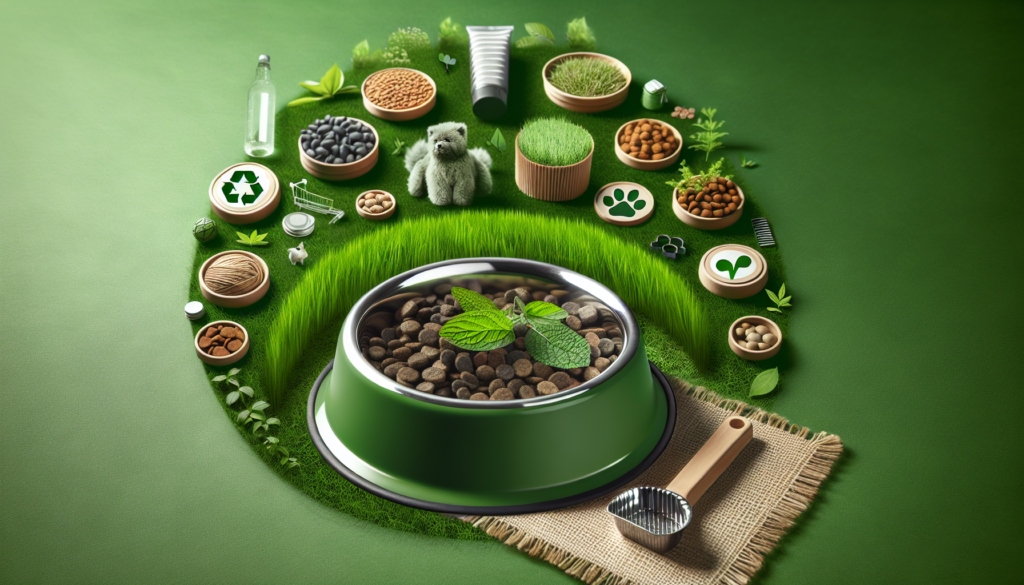Are you a proud pet owner who loves your furry friend and wants to do your part in helping the environment? Look no further! In this article, we will share with you some eco-friendly pet care tips that are easy to implement and will benefit both your pet and the planet. From choosing sustainable pet products to minimizing waste and reducing carbon pawprints, these simple yet effective tips will ensure that your pet receives the best care while reducing your ecological footprint. Let’s dive in and discover how we can make a positive difference for our pets and the earth.
Choosing eco-friendly pet products
When it comes to choosing pet products, it’s important to consider their environmental impact. One way to do this is by opting for biodegradable pet waste bags. These bags are designed to break down over time, reducing their contribution to landfill waste. Look for bags made from plant-based materials such as cornstarch or vegetable oils.
In addition to waste bags, it’s also important to choose eco-friendly pet shampoos and grooming products. Many conventional pet products contain harsh chemicals that can be harmful to both your pet and the environment. Look for products that are made from natural and organic ingredients, without any synthetic fragrances or dyes.
Another aspect of eco-friendly pet care is choosing natural and organic pet treats and food. Many pet foods are made with low-quality ingredients that can have a negative impact on the environment. Look for brands that use sustainably sourced ingredients and have eco-friendly packaging. You can also consider making homemade pet food using locally sourced and organic ingredients.
Lastly, consider pet toys made from sustainable materials. Many pet toys are made from plastic or other non-recyclable materials. Look for toys made from natural materials such as organic cotton, hemp, or recycled materials. These toys not only reduce waste but also provide a healthier and safer option for your pet.
Reducing pet waste
Pet waste is a significant environmental concern, but there are steps you can take to reduce its impact. One way is by opting for cloth or biodegradable pet bedding. Traditional pet bedding is often made from synthetic materials that can take a long time to decompose. Cloth bedding, on the other hand, can be easily washed and reused, reducing waste.
For cat owners, using reusable or compostable litter can make a big difference. Traditional clay or silica-based litters are not biodegradable and can contribute to landfill waste. Opt for litters made from natural materials like wood pellets, recycled paper, or corn. These litters can be composted or recycled, reducing their environmental impact.
Another way to reduce pet waste is by training your pet to use eco-friendly poop alternatives. For example, you can teach your dog to use a designated area in your yard filled with wood chips or gravel instead of relying on plastic bags. For cats, consider using a specially designed toilet training system that eliminates the need for litter altogether.
If you have a yard, consider installing a pet waste composter. These systems use natural decomposition processes to break down pet waste into compost that can be safely used in your garden. By composting pet waste, you not only reduce landfill waste but also provide a valuable source of nutrients for your plants.

Conserving water
Conserving water is an important aspect of eco-friendly pet care. One way to do this is by using a water-saving pet bowl. These bowls are designed to reduce water usage by controlling the flow and preventing spills. Look for bowls with features like adjustable water levels or integrated filters that can help conserve water.
When it comes to bathing your pet, consider doing it outdoors or in a water-saving tub. Outdoor baths allow you to use natural water sources such as rainwater or collected water from other household activities. Alternatively, you can use a smaller tub or basin that requires less water to fill. Be sure to use eco-friendly shampoos and grooming products to minimize the impact on the environment.
Another way to conserve water is by collecting and reusing pet bathing water for plants. After bathing your pet, collect the water and use it to water your garden or indoor plants. Just be sure to use pet-safe shampoos and avoid using water that has come into contact with chemicals or pesticides.
Finally, be mindful of any leaks in your pet’s water sources. A dripping water bowl or leaky hose can waste a significant amount of water over time. Regularly check and maintain your pet’s water sources to ensure they are not wasting water unintentionally.
Choosing eco-friendly pet transportation
Transporting your pet in an eco-friendly way is another aspect of sustainable pet care. When possible, opt for alternative transportation methods that reduce carbon emissions. If you need to travel short distances, consider walking or cycling with your pet. Not only is this environmentally friendly, but it also provides exercise and bonding time for both you and your pet.
For longer journeys, using public transportation or carpooling can help reduce your carbon footprint. Many cities now have pet-friendly public transportation options, so be sure to check the rules and regulations before you go. Carpooling with other pet owners also reduces the number of vehicles on the road, ultimately reducing emissions.
When it comes to carriers for pets, choose eco-friendly options. Look for carriers made from recycled materials or natural fibers like cotton or hemp. Avoid carriers made from plastic or other non-recyclable materials. Additionally, consider the size of the carrier. Choosing a carrier that is appropriately sized for your pet can help minimize wasted space and reduce the energy required for transportation.

Creating an eco-friendly pet environment
Creating an eco-friendly environment for your pet is not only beneficial for the planet but also for their health and well-being. Start by using natural and non-toxic cleaning products in your home. Many conventional cleaning products contain harsh chemicals that can be harmful to pets. Instead, opt for natural alternatives like vinegar, baking soda, or pet-safe cleaning products.
Provide your pet with eco-friendly bedding and toys. Look for bedding made from organic cotton or hemp, which are both sustainable and pesticide-free. Avoid bedding made from synthetic materials or treated with harmful chemicals. For toys, choose options made from natural materials like organic cotton, hemp, or recycled materials.
If you have a yard, consider planting pet-safe and non-invasive plants. Some common plants like lilies, azaleas, and daffodils can be toxic to pets if ingested. Instead, choose pet-friendly plants like catnip, rosemary, or pet grass. Additionally, avoid using chemical pesticides or fertilizers in your yard. Opt for natural and pet-safe alternatives to keep pests away and promote a healthy environment for your pet.
Adopting a sustainable feeding routine
Feeding your pet in a sustainable way is another important aspect of eco-friendly pet care. Avoid overfeeding your pet, as this not only leads to potential health problems but also contributes to food waste. Follow feeding guidelines provided by your veterinarian and measure out the appropriate portion sizes for your pet’s size and activity level.
Consider opting for sustainably sourced pet food. Many pet foods use ingredients that are not sustainably produced and can have environmental consequences such as deforestation or overfishing. Look for brands that prioritize sustainable sourcing and have certifications such as MSC (Marine Stewardship Council) for seafood or RSPO (Roundtable on Sustainable Palm Oil) for palm oil.
Another option is to make homemade pet food. This allows you to have full control over the ingredients and sourcing, reducing the environmental impact. When making homemade pet food, opt for locally sourced and organic ingredients whenever possible. Be sure to consult with your veterinarian to ensure a balanced and nutritious diet for your pet.
Minimize single-use packaging for pet food by buying in bulk. Many pet food stores now offer bulk options, allowing you to bring your own reusable containers and reduce unnecessary packaging waste. If bulk options are not available, choose brands with recyclable packaging or minimal packaging. Repurpose pet food bags for other uses, such as storage or as garbage bags, to give them a second life before disposal.
Promoting sustainable pet grooming
Grooming is an essential part of pet care, but it’s important to do it in an eco-friendly way. Start by using eco-friendly grooming tools. Look for brushes and combs made from sustainable materials like bamboo or wood, as well as grooming tools made from compostable or recycled materials.
Minimize water usage during pet grooming by using dry shampoo or waterless grooming products. These products eliminate the need for water and reduce the overall environmental impact of grooming. Additionally, consider reducing the frequency of grooming sessions. Unless your pet has specific grooming needs, most pets can go longer between baths without any negative effects on their health.
When bathing your pet, choose natural and biodegradable grooming products. Many conventional grooming products contain harsh chemicals that can be harmful to both your pet and the environment. Look for products that are made from natural and organic ingredients, without any synthetic fragrances or dyes. Be sure to properly dispose of any leftover products or containers in an environmentally responsible way.
Supporting sustainable pet healthcare
Caring for your pet’s health in an eco-friendly way is important for both their well-being and the environment. Choose eco-friendly and natural pet healthcare products whenever possible. Many conventional pet healthcare products contain chemicals that can have negative effects on both pets and the environment. Look for products that are made from natural ingredients and are free from synthetic additives or fragrances.
Opt for preventive care to reduce the need for medications. Regular check-ups, vaccinations, and dental care can help keep your pet healthy and reduce the reliance on medications. Additionally, consider alternative therapies and natural remedies for common ailments. Consult with your veterinarian to explore options such as acupuncture, herbal remedies, or physical therapy.
Properly dispose of expired medications. When medications expire, they can become ineffective or even harmful. Avoid flushing medications down the toilet or throwing them in the trash, as they can end up in waterways or the environment. Many pharmacies or veterinary clinics have medication take-back programs, where you can safely dispose of unused or expired medications.
Reducing pet food packaging waste
Pet food packaging can contribute to a significant amount of waste, but there are steps you can take to reduce it. Buying pet food in bulk is one option. Many pet food stores offer bulk bins where you can scoop out the desired quantity of pet food into your own reusable containers. This eliminates the need for individual packaging and reduces waste.
When purchasing pet food, opt for brands with recyclable packaging. Look for packaging made from materials like paper, cardboard, or aluminum that can be recycled in your local recycling program. Avoid packaging made from non-recyclable materials like plastic or multi-layered materials.
Another option is to choose pet food with minimal packaging. Some brands offer eco-friendly alternatives that prioritize reducing packaging waste. These products often come in simple, minimalistic packaging without any unnecessary bells and whistles.
To repurpose pet food bags, consider using them for other storage needs. The large size and durability of these bags make them great for storing items like pet supplies, gardening tools, or even as garbage bags. Be sure to clean the bags thoroughly before repurposing them and dispose of them properly when they are no longer usable.
Spreading awareness and education
Spreading awareness and educating others about eco-friendly pet care is crucial in promoting sustainable practices. Share tips and resources through social media to reach a wider audience. Post about the importance of eco-friendly pet care, provide tips and tricks, and share success stories from your own journey.
Consider volunteering or supporting organizations that promote eco-friendly pet care. Many animal welfare and environmental organizations have programs dedicated to promoting sustainable pet care practices. Get involved in community events, fundraisers, or educational programs to make a difference in your local area.
Encourage local pet stores to carry sustainable pet products. Talk to store owners or managers about the demand for eco-friendly pet products and the benefits they offer both pets and the environment. By encouraging stores to stock these products, you can help make them more accessible and encourage others to make sustainable choices for their pets.

